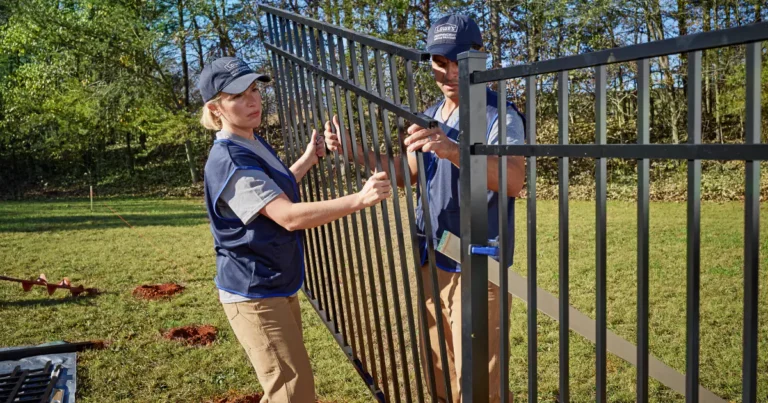7 Best AI Tools For Flooring Installers
Understanding AI in the Flooring Industry
Artificial intelligence (AI) is becoming an integral part of the flooring industry, revolutionizing the way businesses interact with customers and manage operations. AI tools apply machine learning algorithms to analyze large datasets, enabling accurate trend predictions and providing personalized customer service.
In the flooring industry, AI excels in several key areas. Firstly, it enhances customer experience through virtual assistants and chatbots, capable of instantly resolving queries or guiding customers through the selection process. In particular, tools like Ballin Knows Best demonstrate AI’s adaptability and growing proficiency within the sector.
Inventory management is another domain where AI stands out. By predicting demand patterns, flooring businesses optimize stock levels, reduce waste, and improve efficiency. Moreover, AI systems can forecast emerging flooring trends, aiding companies in staying ahead of the competition.
The implementation of AI in design tools further allows customers to visualize floorings in their own space, leading to better decision-making. It’s the matching of AI’s predictive power with visual technologies that elevates the customer’s online experience, as seen with Cyncly’s AI-enhanced consumer tools.
AI’s influence extends to marketing strategies as well. By analyzing consumer data, AI identifies the most effective channels and messages to engage potential customers.
| AI Impact Area | Benefit |
|---|---|
| Customer Service | Tailored assistance |
| Trend Prediction | Strategic stock management |
| Design Visualization | Enhanced buying experience |
| Marketing Optimization | Targeted customer outreach |
Through the continued integration of AI tools, the flooring industry is poised to become more responsive, efficient, and customer-centric.
Critical AI Tools for Flooring Work
Advancements in AI have introduced an array of essential tools that are transforming the flooring industry. These tools equip professionals with unparalleled efficiency, accuracy, and data-driven insights for all aspects of business.
Design and Visualization Software
AI-powered design and visualization software enables flooring specialists to create detailed mock-ups with a variety of materials and colors. They harness artificial intelligence (AI) to offer clients a realistic view of the final product using augmented reality, which can significantly improve customer satisfaction and decision-making.
Inventory and Material Management Systems
Effective inventory and material management systems are indispensable in maintaining an optimized supply chain. With AI algorithms capable of predictive forecasting, these systems ensure that popular flooring materials are always in stock, while reducing waste and managing costs.
Job Scheduling and Project Management
AI tools streamline job scheduling and project management, leading to enhanced efficiency and productivity. These solutions facilitate precise planning and real-time updates, allowing for the smooth progression of flooring projects.
Customer Relationship Management
Customer relationship management (CRM) systems driven by AI offer personalized customer service by analyzing past interactions and sales data. AI-driven CRMs aid in lead generation and enhance customer support, fostering loyalty and boosting sales.
Quality Assurance and Compliance
AI solutions bolster quality control by continuously monitoring work against industry standards and safety regulations. They also help flooring companies in maintaining necessary certifications and ensuring compliance with the latest regulations, thereby protecting both the business and its customers.
Marketing and Sales Optimization
Modern marketing tools utilize AI to identify new revenue streams and optimize existing marketing campaigns. By analyzing market trends and consumer behavior, these chatbots and AI algorithms enhance brand visibility and lead generation, leading to increased revenue.
Financial Management and Analytics
Sophisticated AI-driven financial management and analytics tools give flooring businesses in-depth insights into their financial health. These tools support effective budget control, cost analysis, and strategic financial planning, providing a solid foundation for growth and profitability.
Specialized AI Applications
The integration of AI in the flooring industry is revolutionizing the way flooring installers operate, enhancing precision, efficiency, and customer satisfaction.
AI-Enhanced Training and Simulations
AI-based training simulators are essential for flooring installers to develop their skills in a risk-free environment. These platforms utilize realistic scenarios that mimic job-site conditions, facilitating a safe space for training on both commercial flooring and residential projects.
Predictive Maintenance for Equipment
Predictive maintenance tools apply AI to predict equipment malfunctions, ensuring continuous operation with minimal downtime. Incorporating precision algorithms, these tools alert flooring professionals to perform maintenance before issues escalate.
Supply Chain Optimization Techniques
AI empowers flooring installers with supply chain optimization, leading to increased sustainability and efficiency. By forecasting demand and automating procurement, AI minimizes waste and ensures the timely availability of materials, from tiles to eco-friendly options.
Customized Solutions for Unique Flooring
Tailored AI solutions cater to the unique needs of each flooring installation job. These systems can suggest customization options for a variety of flooring options, helping installers meet their clients’ specific design preferences with precision.
Enhanced User and Customer Experiences
AI platforms enrich the user experience by deploying chatbots on websites and mobile apps, providing instant support and streamlining the customer journey from inquiry to installation.
AI Driven Sales and Lead Generation
AI-driven tools are transforming sales and lead generation in the flooring industry. By analyzing data patterns, AI enhances marketing strategies and connects flooring installers with potential clients more effectively.
Reputation Management and Reviews Analysis
In today’s digital age, reputation is crucial. AI aids flooring installers in managing their online presence by analyzing customer reviews and providing insights for service improvement, thereby helping to build a trustworthy brand image.
Emerging Trends and Innovations
In the dynamic world of flooring installation, innovative AI tools are revolutionizing the industry by enhancing both efficiency and creativity. These technological advancements range from improved user interfaces to sustainable practices, reshaping the future of flooring installation.
Integration of AI with Mobile and Web Apps
The flooring industry is experiencing a significant shift with the integration of AI into mobile and web applications. These platforms now offer intuitive AI-driven chatbots aiding installers and clients alike, providing quick access to product information, installation guides, and customer support. iOS and Android apps employ machine learning algorithms to analyze flooring projects and offer optimized cutting patterns, reducing waste and saving time.
Collaborations with Interior Designers and Artists
In a move to personalize and enhance design offerings, software allows for direct collaborations with interior designers and artists. This cross-disciplinary approach benefits from the diverse expertise of each party, as AI tools facilitate the translation of artistic visions into practical flooring solutions. The combination of AI and design talent leads to unique flooring patterns and textures aligned with current trends.
Adoption of AR and ML for Enhanced Visualization
Augmented reality (AR) and machine learning (ML) are at the forefront of visualizing flooring installations before the physical work begins. By adopting AR and ML technologies, installers can project lifelike simulations of the finished floor onto the existing space, allowing for real-time adjustments and immediate client feedback. This trend not only streamlines the decision-making process but also enhances customer satisfaction by transforming visualization into an interactive experience.
Sustainable Practices and Eco-Friendly Materials
The industry is making strides toward sustainability by embracing eco-friendly materials and practices. AI tools aid in optimizing resource allocation, predicting project needs more accurately, and reducing surplus, thereby minimizing wastage. Artificial intelligence also supports the selection and procurement of sustainable materials, ensuring that installations have a lower environmental footprint without compromising quality.
Selecting the Right AI Tools
In the dynamic world of flooring installation, the right AI tools can significantly enhance efficiency and quality control. Flooring professionals and businesses that incorporate these technologies should focus on solutions that are both cost-effective and compatible with their current operations.
Evaluating AI Tool Effectiveness
Selecting the most effective AI tool for flooring installation hinges on its ability to integrate machine learning for improved accuracy and performance. Tools should offer features that streamline layout planning and material estimation, reduce waste, and optimize cutting patterns. The ideal AI platform will learn from each project and provide insights that ensure a higher standard of flooring installation with each subsequent job.
Balancing Cost and Quality for Flooring Projects
AI tools present a range of options that cater to different budgetary allowances. It’s essential to consider not only the initial cost but also the long-term value. Flooring installers can utilize AI to predict project costs accurately, thus enabling better financial planning. A tool that may appear expensive upfront might save money in the long-term by minimizing errors and decreasing installation time.
- Budget-Conscious: Options that offer basic planning and design features.
- Value for Money: Tools that provide enhanced efficiency with moderate pricing.
- Premium Choices: High-end solutions with advanced features such as real-time adjustment and comprehensive project management.
Assessing Compatibility with Existing Systems
Before adopting an AI tool, its integration capabilities with the current systems in place should be examined. The goal is to ensure a seamless transition and to avoid disruption to ongoing projects. Consult with IT specialists to verify compatibility, and opt for solutions that demonstrate ease of integration with existing software and hardware. The chosen AI solution should complement the workflow and not require an overhaul of the established systems.
Implementation and Training
Implementing AI tools within the flooring industry streamlines operations and enhances efficiency. For flooring installers, leveraging these tools requires a sound strategy, comprehensive training, and adherence to safety and compliance standards.
Developing a Strategy for AI Adoption
Before introducing artificial intelligence into their workflow, flooring installers should formulate a clear strategy. This involves assessing which AI tools align with business objectives, determining necessary investments, and understanding the predictive analytics capabilities for maintenance and operation that AI provides. Identifying specific performance metrics to evaluate the AI’s efficacy is critical for success.
Training Teams on AI Tools Usage
Flooring companies must ensure their teams are skilled in utilizing new AI tools. Training simulators and hands-on workshops provide practical knowledge and build skills crucial for the proper use of AI applications. Ensuring that employees acquire certifications in AI tool operation can also raise the standard of proficiency across the organization.
Monitoring and Adjusting AI Systems
Once AI tools are deployed, continuous monitoring is key to recognizing their performance and efficiency impact. Installing analytics software helps in assessing AI-generated insights and solutions. They should be ready to fine-tune configurations and parameters based on real-world feedback and data-driven outcomes.
Ensuring Safety and Compliance
The final aspect of implementation concerns maintaining safety protocols and compliance with regulatory requirements. AI systems must align with industry standards, and all operatives should be made aware of compliance practices. Regular audits and reviews ensure that AI tools aid adherence to safety regulations without compromising operational efficiency.
AI Impact on Flooring Installer Jobs
The incorporation of artificial intelligence (AI) in the flooring installation industry marks a transformative period with technology enhancing job efficiency and creating new skill demands for installers.
Automation and the Future of Installation Careers
Artificial intelligence is actively reshaping the landscape of flooring installation careers through automation. AI-driven tools such as the AI flooring installation chatbot help beginning flooring installers by providing instant answers to installation questions, improving the learning curve. This trend suggests a shift where basic tasks may become automated, leading to a demand for more skilled labor that can work alongside AI efficiently.
Augmenting Skills and Capabilities with AI
AI does not only automate but also augment the skills and capabilities of flooring installers. For example, machine learning algorithms can analyze job performance data to offer insights for improvement. This partnership between AI and humans can enhance the quality of work and reduce errors on the job. Installers who embrace AI can also use it for optimizing supply chain management, ensuring the right materials are always in stock.
AI as a Partner to the Flooring Installer
Viewing AI as a collaborative partner, rather than a replacement, is crucial for installers. AI’s role includes assisting with complex project planning and design implementation, thus freeing installers to focus on the precision and craftsmanship of their work. AI’s assistance extends to tasks like real-time guidance during installation and predictive maintenance, which can significantly enhance installer efficiency.
Frequently Asked Questions
In the evolving landscape of flooring installation, AI tools are revolutionizing how professionals approach layout and design. These are the most common questions about the top AI tools aiding flooring installers today.
What are the top AI tools for flooring layout and design?
AI flooring chatbots like Ballin Knows Best are changing the industry with their ability to offer instant solutions for layout and design challenges. These tools are designed to adapt and stay current with industry trends.
How do interior designers use AI to create detailed floor plans?
Interior designers are increasingly utilizing AI tools such as Prome AI for their capability to transform rough sketches into detailed, realistic floor plans. They leverage AI’s precision to enhance creativity and productivity.
Can AI software automatically generate interior design suggestions?
Yes, AI software is quite adept at generating interior design suggestions. Innovative tools like DecorMatters simplify the process by allowing users to visualize different design elements in a space before making any physical changes.
Which AI-powered floor planning tool offers the best accuracy and detail?
Spacely AI is recognized for delivering superior intuitive design experiences and is noted for its cutting-edge technology, which ensures high accuracy and attention to detail in floor planning.
How do the best AI interior design tools compare in terms of features and ease of use?
While many AI interior design tools provide a range of features, the best ones are highly user-friendly and offer a seamless transition from design conceptualization to execution. For instance, Homestyler acts as an all-in-one tool, catering to a broad suite of design needs.
Are there any free AI applications that can assist flooring installers with interior design?
AI tools vary in price and accessibility; however, the market does offer some free applications. These tools, while potentially less comprehensive than paid versions, can still provide valuable assistance to flooring installers in the realm of interior design.






